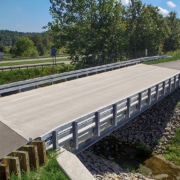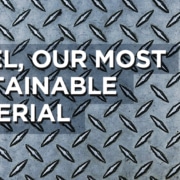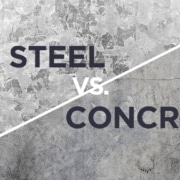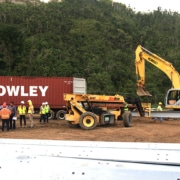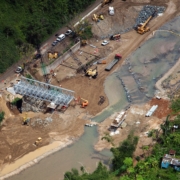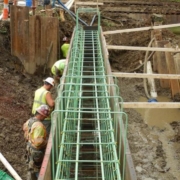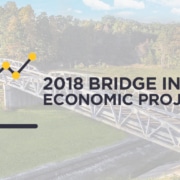The Importance of Adopting Green Construction Practices
Sustainability is a hot topic lately; stakeholders across all industries are being compelled to switch their practices to incorporate more “green” practices in the interest of protecting the planet from further pollution and complying with new regulations. The construction industry is no exception; green construction is taking over the sector. Construction firms are adopting green construction practices to ensure that future projects are built sustainably and that cities are cleaner places to live and work.
What is Green Construction?
According to the U.S. Environmental Protection Agency (EPA), “green construction is the practice of creating structures and using processes that are environmentally responsible and resource-efficient throughout a building’s life cycle.” This includes the design and construction of the building, as well as any future operations, maintenance, and renovations. More and more construction companies are adopting green practices in their building projects. In 2021, 47% of construction companies identified 60% of its projects as green building projects. This represents significant growth, compared to only 27% of construction firms making this claim in 2018.
The environmental benefits of sustainable construction are numerous, including:
- Enhancing and protecting the ecosystem. Construction zones are notorious for being environmentally hazardous. Implementing green construction practices will help reduce the long-term devastation of ecosystems and their inhabitants.
- Improving air and water quality. According to the World Green Building Council, the construction industry generates an estimated 39% of the world’s total carbon emissions. Structures built using green construction practices create less pollution than those built using traditional construction tactics.
- Reducing waste. In a 2018 study, the EPA found that the United States produced over 600 million tons of construction-related waste. Green construction sites produce significantly less waste than traditional construction sites.
- Conserving and restoring natural resources. These modern buildings utilize natural, renewable energy resources to create electricity. Wind turbines, solar panels, and water pump systems all power these green buildings without creating waste or burning fossil fuels.
Examples of Green Construction
Thankfully, we are seeing more and more green buildings pop up across the globe. These structures are not only striking to look at and great examples of modern architecture, but they are also paving the way for green buildings to be the norm instead of the exception.
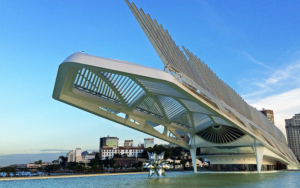
Museum of Tomorrow – Rio de Janeiro, Brazil
This incredible science museum is beautiful to look at and a testament to the future of architecture. The building features adjustable, fin-like solar panels and a revolutionary air-conditioning system that distributes the cold water from Guanabara Bay throughout the building. This all-natural method of providing cool air throughout the building is a great energy saver.
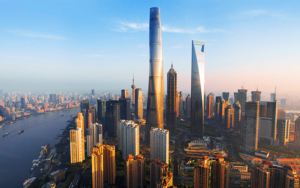
Shanghai Tower – Shanghai, China
The Shanghai Tower is the world’s second-tallest building, measuring 2,073 feet. This building is wrapped in a transparent second layer through which captured air serves as natural ventilation. This innovation, including the 270 wind turbines that power the building’s external lights, significantly reduced energy costs and waste.
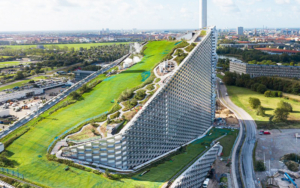
CopenHill – Copenhagen, Denmark
This power plant burns waste to generate electricity. Every year, 440,000 tons of garbage is converted into clean electricity and heating for 150,000 nearby homes. In addition to being a green power plant, this building is a sports facility with one of the world’s tallest climbing towers and artificial ski slopes.
The Future is Green
The Inflation Reduction Act of 2022 represents the largest investment in climate action in U.S. history. This bill directs $370 billion over the next decade to rapidly increase renewable energy production and create significant reductions in greenhouse gas emissions. This will be accomplished by accelerating the production of clean energy, vehicles, buildings, and manufacturing.
Backed by federal funding, states and cities will hopefully continue to turn to more green construction practices in the future.
Durable, Sustainable Bridges
Here at U.S. Bridge, we believe in building bridges that positively affect the community and that will last decades. Construction has a major impact on a country’s environment, including its carbon footprint.
As industry leaders and an AISC-recognized supplier, we work directly with companies around the world—without middlemen—to engineer, manufacture, and construct high-quality steel bridges for every project. Steel is a strong, recyclable, and versatile material that is great for construction.
That’s why we’re proud to offer a wide selection of prefabricated bridges specifically designed for your project.
Contact us for a free estimate, or use our industry-leading Bridgescope tool to begin planning your project now!


